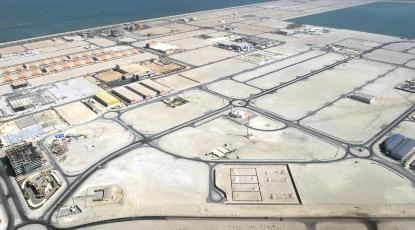Having long recognised the need to diversify its economy away from oil, the Kingdom was one of the first Gulf states to start developing a broad array of sectors to contribute to growth. As a result, financial services now account for 24.7% of GDP, making it the largest contributor to the economy, with manufacturing's contribution coming in second at 16.7%, followed by heavy industries such as mining and quarrying, which contributed 13.1%, according to the Bahrain Economic Development Board.
The construction of a new $16bn mega-city is expected to play a key role in helping industry close the gap on financial services in the coming years while also further expanding the non-oil sector of Bahrain's economy. The project, however, remains subject to extensive assessments.
The government first announced it was considering the creation of a new industrial hub in August 2011, although no details were given at the time. Through a series of statements, the Kingdom has now announced that the mixed-use city will be built on 95 sq km of reclaimed land, with areas earmarked for commercial, residential and recreational facilities, alongside industrial zones.
The minister of industry and commerce, Hassan Fakhro, said on July 7 that a feasibility study and initial plans for the industrial development had been submitted to Cabinet and would be passed to the infrastructure and services committee for more detailed assessment. He added that the project, which is scheduled to be fully operational by 2040, was expected to increase GDP by 20%, generating up to $13bn annually and providing employment for 240,000 workers.
The government's decision to create a new industrial city rather than expand existing hubs such as the Salman Industrial City in the Hidd district forms part of a broader bid to make optimum use of Bahrain's limited land resource.
Aware that suitable land for major developments in Bahrain is at a premium, Fakhro brought the topical reclamation issue to a head late last year by giving a two-year timescale in which areas set aside for industrial zones could be fully utilised.
While the mega-city will give Bahrain's economic development a huge boost, the details of how exactly it will be funded are still unclear. The government has said it envisages the industrial city taking the form of a joint development between the public and private sectors.
Some observers, however, suggest the state will have to take the lead in laying the groundwork and establishing initial infrastructure. Others have also questioned how many of the 240,000 jobs forecast to be created at the city will be allocated to Bahrainis rather than expatriate workers.
While the government pursues an active policy of "Bahrainisation", promoting the employment of nationals across the sectors, it is considering easing targets and quotas in fields where employers are struggling to attract sufficient local staff for jobs, especially lower-paid, manual work.
Aluminium Bahrain (Alba), for example, like a number of large employers, currently recruits more than 80% of its workforce from the local labour market. However, in small and medium-sized enterprises (SMEs) that cannot meet the higher wages that Bahrainis demand, the ratio of local employees can be a much lower 20%.
While the outcome of assessments for the project will determine its initial progress, many observers believe that generating interest among investors, especially foreigner industrial entities, will be a key factor to the city's longer-term success.
Restoring investor confidence was seen as one of the major challenges facing the kingdom in the wake of last year's unrest, along with identifying solutions to other key, contentious issues.
Bahrain's heavy-industry giants are firmly established with local companies such as Alba and the Gulf Petrochemical Industries Company, which are currently responsible for two-thirds of industrial output. The government will therefore be looking to new entries to help drive further expansion and working to convince investors that Bahrain offers good prospects and stability for companies seeking a Gulf base they can use to break into the Middle Eastern market.
Oxford Business Group
5 August
























































